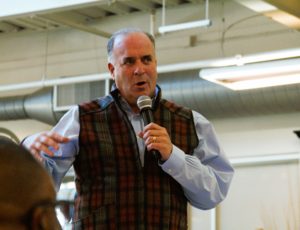By Paul Rozycki
As the 2024 election year begins it reminds one of the ancient curse, often attributed to the Chinese, which says “May you live in interesting times”, suggesting that those interesting times will arise from much conflict and turmoil. There is little doubt that 2024 will be an “interesting” one politically. Whether it is a curse or not remains to be seen, but the threat will be there on the national, state, and local levels.
On the national level we are looking at a rematch of the 2020 election, with both candidates having high negative ratings and several third parties at the margin that could throw the election in unpredictable ways.
On the state level, it’s likely that a number of state legislative districts in southeast Michigan will be redrawn, and several special elections will hold the Democratic State House majority in limbo until they are completed.
On the local level, for the first time in almost 50 years, there won’t be a Kildee running for Congress, in what may become a competitive district. The Flint City Council will be trying to get a quorum in order to set a special election for the 7th Ward, as members attempt to recall each other, and both the Flint Community Schools and Mott Community College boards will hold elections in the midst of division and controversy.
On the national level
Pundits are searching for new adjectives to describe the upcoming 2024 presidential election. ‘Historic’ and ‘unprecedented’ are among the most common, but both seem inadequate as an 81-year-old incumbent president seems likely to face a 77-year-old ex-president who has 91 criminal charges hanging over him as the campaign begins, and who threatens to be a dictator “only on day one.”
On most issues and based on his record over the last three years, President Joe Biden should be in a much better position than he is right now. The economy is improving, unemployment is low, inflation is falling, the stock market is near record highs, and the pandemic is receding. Yet most polls show that even within the Democratic Party a significant number hope for another candidate.
Even though he defeated Donald Trump by seven million votes last time, several polls show him behind as we begin 2024. This may be due to his age, a general anti-incumbent attitude in the nation, as well as division within the Democratic Party over the Israel-Hamas war. On the plus side for Democrats, the public reaction against Trump and his turmoil might be enough to turn the polls around come November.
At this writing, in early January, Donald Trump appears to be the all but certain nominee of the Republican Party. Most polls give him a 50% margin over his nearest competitors Florida Gov. Ron DeSantis and former South Carolina Gov. Nikki Haley, who seem to be competing for second place. Yet, while Trump has a vice-grip on his core supporters within the party, he remains unpopular with independents and more than a few traditional Republicans. The feeling is that his cult-like support may serve him well to win the nomination but will hurt him in November. From Trump’s recent statements, the implications of a second Trump term are more worrisome and ominous that his first term, as he promises to seek revenge against his opponents, and be a dictator on “day one”, but that is a topic for another column.
Trump and the courts
As we go through the spring primary season and move to the national conventions this summer, Trump will also be on track for a series of court appearances that could result in criminal convictions and prison time as he faces 91 criminal charges on both the state and national level. We may see competing newscasts of primary results and court rulings during the spring and summer.
Early in the year the U.S. Supreme Court will be deciding on whether states can keep Trump off the ballot because of a violation of the 14th Amendment that prohibits those engaged in insurrection from holding federal office. So far two states, Colorado and Maine have barred him from the ballot, while Michigan and a number of others have kept his name on.
Third parties role
To make things even more unpredictable and unprecedented, there are a number of third parties which may run candidates for president. Though the No Labels Party, the Green Party, or the Libertarians are unlikely to win, they could draw just enough votes away from the major candidates to influence the outcome, especially in some key states. Third parties often do better when there is dissatisfaction with the major party candidates.
On the state level
For the first time in 40 years Democrats have a majority in the Michigan State House and the State Senate. However, recently two Democratic members of the State House were elected to local office in suburban Detroit, resulting in a 54-54 deadlock until special elections are held in the spring. Democrats have a good chance of winning those special elections, but nothing is certain.
This year the state will also be required to redraw election districts for at least 13 state legislative districts in time for the 2024 election. Courts have ruled that a number of election districts in the Detroit area were drawn in violation of the Voting Right Act and needed to be redone. How that will be done and how quickly that will be done remains an open question. In any case it may have a major impact on the state legislature.
At the moment the Michigan Republican Party is deeply divided and in turmoil over the attempted ouster of party chair Kristina Karamo. Whether she is finally removed, who replaces her, and whether the divisions can be healed are all matters remaining to be seen.
Senator Debbie Stabenow announced that she is not running for reelection this year. Among the Democrats running to replace her are Elissa Slotkin, who is considered the frontrunner. Also running for the Democratic nomination are actor Hill Harper, state Rep. Leslie Love of Detroit; Dearborn businessman Nasser Beydoun and Ann Arbor lawyer Zack Burns.

U.S. Senator Debbie Stabenow at a Whitmer/Gilchrist campaign event in 2022. (Photo by Tom Travis)
Former U.S. Rep. Mike Rogers is the leading Republican contender to run for Stabenow’s seat and is expected to win the nomination over a half-dozen other Republican hopefuls.
After the November election, we will likely see those who wish to succeed term-limited Gov. Whitmer in 2026 begin their campaigns.
On the local level
While it’s not a local government office, those of using the 8th Congressional District, which includes Flint, Bay City, Saginaw, and Midland will have a new representative next year. Current Congressman Dan Kildee announced that he is not running for reelection and, for the first time since 1976, the Kildee name will not be on the ballot for the U.S. House in this area.

U.S. Representative Dan Kildee speaking at the Flint Farmer’s Market in 2022 for a Whitmer/Gilchrist campaign event. (Photo by Tom Travis)
So far three Democrats and two Republicans have announced they are running for the seat. Democrats Kristen McDonald Rivet, a Bay City State Senator; Pamela Pugh, State Board of Education president; and Dan Moilanen, director of the Michigan Association of Conservation Districts are seeking the Democratic nomination. Flint Mayor Sheldon Neeley has said he is exploring the possibility of running.
Seeking the Republican nomination are Martin Blank, a Saginaw area surgeon, and Paul Junge, who lost to Kildee in 2022 by 10 points.
What is surprising is the number of likely candidates who said they would not run for Kildee’s seat. Those stepping aside included Genesee County Sheriff Chris Swanson, State Senator John Cherry, and former Mayor Karen Weaver. While the district has voted Democratic with the Kildee name on the ticket, it is listed as a tossup by many polling organizations and could be quite competitive this year.
Flint City Council
Beyond the race for Congress, the Flint City Council continues to produce conflict and chaos as several members face potential recalls in the year to come. In the 7th Ward, Allie Herkenroder recently resigned and was replaced by Candice Mushatt, who was appointed. Mushatt is expected to face a special election to finish her term, but the council has yet to produce a quorum to schedule the needed election. It might be held in August rather than in May. Eva Worthing, 9th Ward, said she would remove her name from an attempted recall ballot in May, and leave the council. Also facing potential recalls are Eric Mays, (1st Ward), Ladel Lewis, (2nd Ward), and Jerri Winfrey-Carter, (5th Ward). There are also lawsuits over Eric Mays’ three-month suspension.
In addition this year will see election for some members of both the Flint Board of Education and the Mott College Board of Trustees. Both have seen conflict in recent months and the elections will likely be more contentious than usual.
And that’s just the short list. There may be more surprises along the way.
There is no doubt it will be a year of “interesting times”. Let’s hope it won’t be a curse as well.
EVM Political Commentator Paul Rozycki can be reached at paul.rozycki@mcc.edu. Rozycki also is president of the EVM board.


You must be logged in to post a comment.